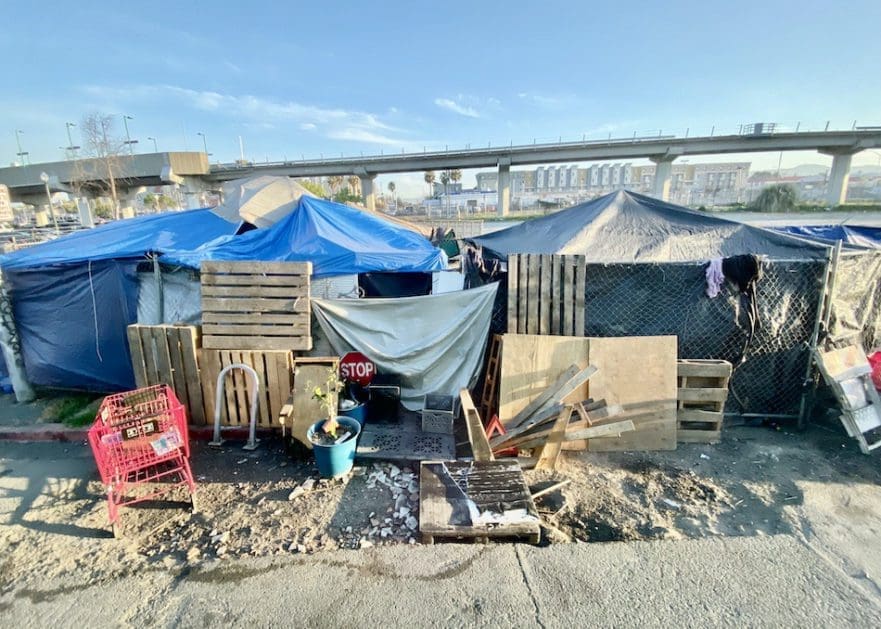Over the course of the COVID-19 pandemic, one thing has become alarmingly clear: middle- and working-class Americans need long-term solutions for major problems that have impacted them for years. That especially applies to the housing affordability and homelessness crises. Short-term relief is crucial, but lawmakers must also come up with policies that help people for the long haul.
In March 2020, soon after the pandemic closed down California and the nation, Housing Is A Human Right pointed out that politicians could no longer put off addressing the housing affordability and homeless crises.
“For years,” Housing Is A Human Right wrote last year, “activists and experts have been saying, repeatedly, that housing is not only a human right, but also a serious public health issue. That people need stable, affordable housing to maintain good health — and the housing affordability and homelessness crises, in California and elsewhere, threaten the public’s health. With the coronavirus pandemic, those cold, hard facts have only become more obvious — and more relevant.”
A new report by Jeffrey Levi, a professor of health management and policy at The George Washington University, underscores that point.
“The U.S. experience of the pandemic was one of the worst in the world,” Levi recently wrote, “and a substantial portion of the suffering and death was driven by our failure to address the health, economic, and social inequities in our country. As we rebuild, we must align across government agencies and across sectors to systematically address these inequities.”
Levi offers short- and long-term recommendations to provide equitable COVID-19 vaccine distribution, to address food and housing insecurity, and to rebuild healthcare and social services, among other issues that need improvements.
“Even as the nation continues to respond and, ultimately, recover from the pandemic,” Levi wrote, “we must begin planning a rebuilding effort. Too often, as a crisis has passed, we have allowed ourselves to forget the lessons of the crisis rather than harnessing that knowledge to better prepare for future crises.”
That approach should apply to the housing affordability and homelessness crises, which have slammed Californians and residents in other states.
During the COVID-19 pandemic, we’ve seen that stable, affordable housing is essential to maintain good health. But the public’s health was quickly imperiled once millions of tenants lost work and couldn’t pay exorbitant rents that have been skyrocketing for years. Between 2010 and 2019, for example, Americans paid landlords a staggering $4.5 trillion in rent — more than the 2018 GDP of Germany, according to Zillow, the real estate site.
Unable to afford sky-high rents, millions of tenants now face an eviction tsunami — along with massive back-rent debt and the dangerous prospect of homelessness. In addition, once evicted, they become more vulnerable to COVID-19 infection and death.
As for homelessness, that crisis has only worsened over the years. In 2019, homelessness in the United States increased three percent compared to the previous year — and marked the third straight year of national-level increases, according to the National Alliance to End Homelessness. In California, home to one-quarter of the nation’s unhoused population, more than 150,000 people are without a home.
Always a weighty public health issue, the homelessness crisis has left a trail of devastation. In Los Angeles County and other hotspots, for example, more unhoused people have been dying in the streets in recent years. The health and well-being of seniors, families, and children have also been negatively impacted by homelessness.
With the COVID-19 pandemic, researchers are now seeing a surge in COVID-19 infections among the unhoused in Los Angeles, New York, and other places. And if renters aren’t provided economic relief and protections, tens of millions of Americans may end up on the streets, facing life-threatening consequences.
All in all, these crises show the desperate need for comprehensive problem-solving.
Similar to what Levi suggests, Housing Is A Human Right, the housing advocacy division of AIDS Healthcare Foundation, has been pressing for both short- and long-term solutions.
Since December, HHR has urged Gov. Gavin Newsom and state legislators to take swift action to help California renters survive the economic impacts of the COVID-19 pandemic. Primarily, HHR has demanded that Newsom and state lawmakers extend the eviction moratorium and use the state’s windfall to provide $5 billion in rent relief, which also helps small landlords.
This week, HHR’s weeks-long call for action was answered. Newsom and the state legislature agreed to extend the eviction moratorium and prepare to deliver billions in rent relief to help tenants and small landlords, although the details need to be ironed out.
For long-term solutions, HHR and AIDS Healthcare Foundation rolled out a housing platform this month, emphasizing the need to rein in sky-high, unfair rents through rent control, reform the state’s harmful Costa-Hawkins and Ellis acts, and create more affordable and homeless housing through the adaptive re-use of hotels and other existing buildings, among other strategies.
Federal, state, and local legislators must take a similar approach: provide short-term help now while instituting long-term policies that finally address housing affordability and homelessness crises that have been raging for years.
With President Joe Biden saying that housing is a right, that especially holds true: lawmakers are now tasked with the duty of ensuring that right is fulfilled.
In a way, the COVID-19 pandemic presents a golden opportunity for politicians to address problems that have long plagued middle- and working-class residents — and tackling housing and homelessness should be a top priority. The looming question is whether or not lawmakers will squander it.
Follow Housing Is A Human Right on Facebook and Twitter.
(Photo by Sharon Hahn Darlin/Creative Commons)

